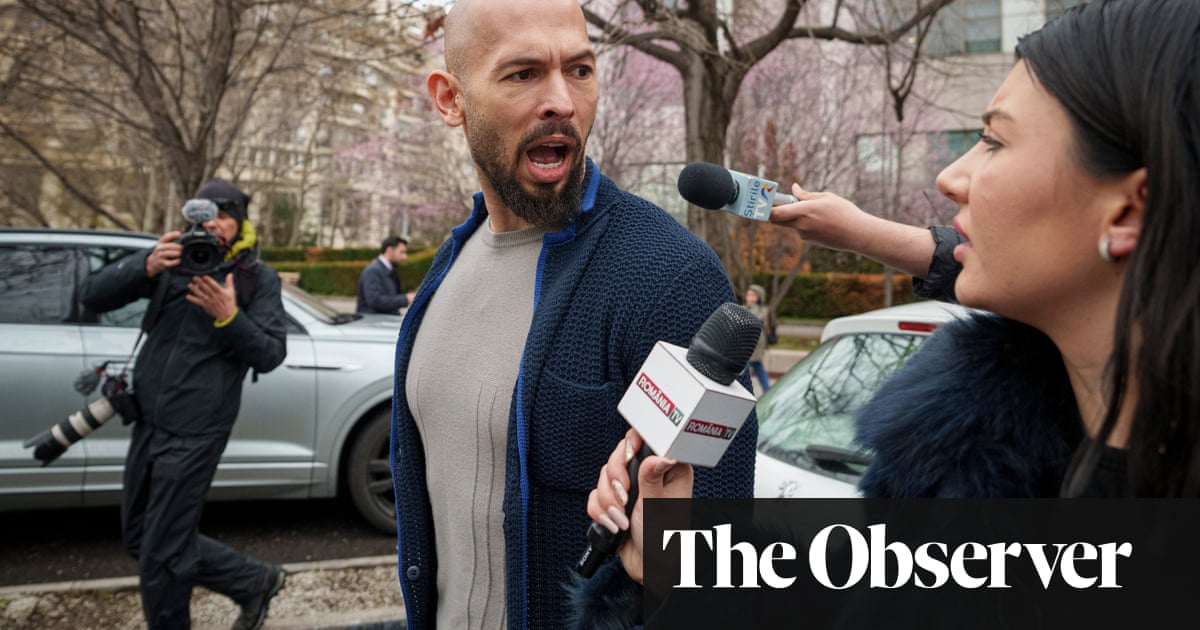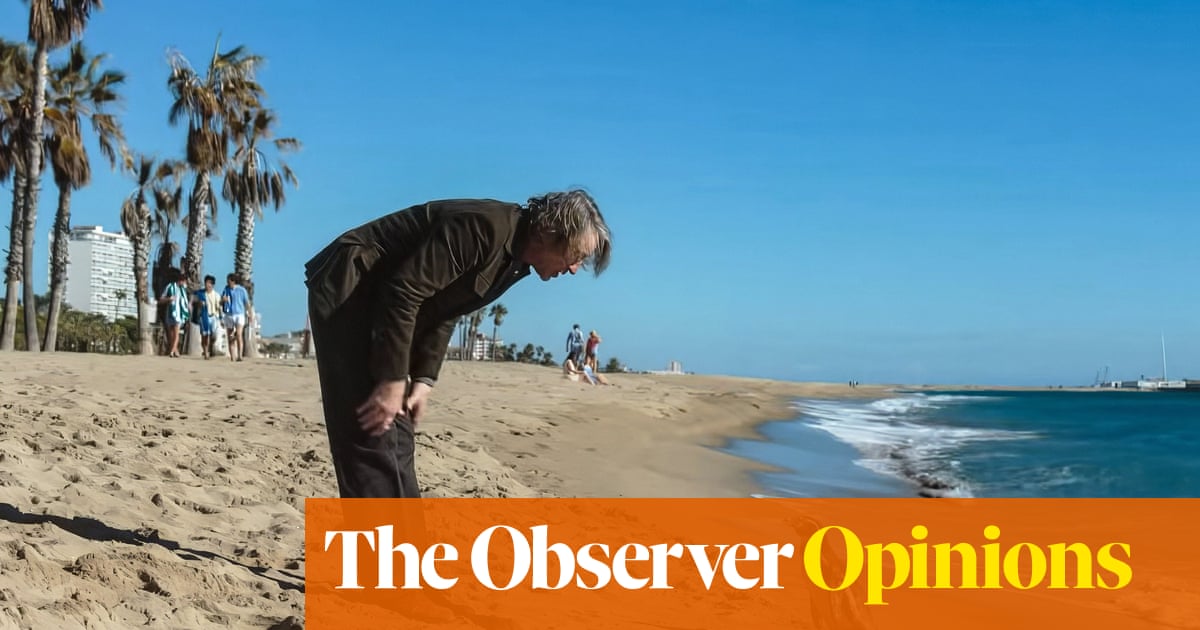The Radio 1 listings for 26 April 1969, when Johnnie Walker made his BBC broadcasting debut, in some ways have a dated air, also boasting shows featuring “Kenny Everett and his granny phone” and “Emperor Rosko’s Midday spin”. However the entry at 2pm for Walker – “The Saturday afternoon listening revolution with music and happiness for all to share” – pretty much applied for the next 55 years of his working life.
Days of the week and stations changed – it was in the Sunday afternoon slot that he made his final Radio 2 broadcast on 27 October last year – but all his most successful shows filled afternoon airtime and the formula of “music and happiness” remained constant. Walker was a notably warm broadcaster, with spiritual beliefs that brought to his broadcasting persona a kindness and empathy rare in an egotistical and ambitious business, leading many listeners to follow him across the five and a half decades of his BBC career.
That word “revolution” in the description of his first show for the corporation has a definite 1960s inflection, but Walker always retained a rebellious streak. He left Radio 1 in the 1970s after complaining about having to play the Bay City Rollers; he was sacked from a station for expressing satisfaction at Baroness Thatcher’s resignation; and on another occasion he was suspended after a red-top newspaper photographed him taking cocaine. Even the radio name of someone born Peter Dingley was a borderline copyright infringement which resulted in the ad-free BBC subliminally advertising a Scottish whisky every time the DJ’s name jingle was played.
“I hated playing by the rules,” he admitted in his well-written and psychologically honest 2007 autobiography, in which he also lamented “a stupid tendency to self-destruct”. As a teenager, he took a summer job to raise money to buy a cassette recorder. Already a would-be DJ, he taped songs from Pick of the Pops and then ad-libbed introductions to them, imagining his bedroom wall as a studio window. But in a moment of angry depression, he later hurled his precious purchase to the concrete path outside – the first of many self-inflicted breaks to his broadcasting.
The edginess may have been exacerbated by Walker being part of a generation of music presenters who began their careers as outlaws, by broadcasting on the “pirate” stations which breached government control of UK airwaves by beaming music shows – with playlists more adventurous than the BBC’s – from barnacled old ships offshore. The detailed section of his memoir that deals with this standoff between generations and cultures is an important contribution to the history of British broadcasting.

Walker started in 1966 on Swinging Radio England, a US-backed venture based on the Olga Patricia, a Panama-registered disused freighter positioned in the North Sea. He intended to present as “Peter Dee”, a pseudonym he had adopted as a dance hall DJ, but was told it was too close to the name of “Roger Day”. Few pirate DJs’ names matched their birth certificates – Everett was born Maurice Cole, the Emperor Rosko was really Michael Pasternak – and Swinging Radio England’s owners had pre-recorded various name jingles that were dished out to new talent. For Peter Dingley, they – not he – chose “Johnnie Walker”. It is not clear if other options were spirit-related, but Walker enjoyed the thought that he might instead have been known as “Jim Bean” or “Glen Morangie.”
The station idents – “Ya get a positive charge, here on Swingin’ Radio England” – were, in contradiction of the network name, recorded in the US by American voices, and the Englishmen among the “boss jocks”, as the DJs had to call themselves, were directed to edge their own accents stateside. Walker found this useful, as he had already moderated his voice to prevent identification as a “Midlands public schoolboy”.
One of five children of a successful businessman and a mother who became a Conservative councillor, he was educated at the fee-paying Solihull School. Despite being a precocious reader and speaker – chosen aged nine to read the lesson at a school service, though too small to be seen behind the lectern – he received an X in all eight of the exams he took. He told his parents that the school must love him as it had covered his final report in kisses. Between jobs as a car mechanic, he began to play records in nightclubs.
In his first pirate gig, as American vowels chased out posh Brummie sounds, Walker developed the smooth, deep, friendly, classless, stateless delivery that made him such an easy listen. Also crucial to his broadcasting development was the Swinging Radio England rule that the audience should never be addressed plurally (“ladies and gentlemen”, “boys and girls”) but spoken to instead as an individual “you”.
Problems with transmission on crowded wavelengths – Swinging Radio England could be drowned out at night by Vatican Radio – led its backers to decamp to Dutch waters. Briefly unemployed, Walker was soon signed by Radio Caroline, an older network reportedly named after President Kennedy’s daughter, until that ship also sailed, in 1968, due to the Labour government’s aggressive legal pursuit of the pirates, and the launch of Radio 1 in 1967 as a law-abiding alternative for UK youth. Having listened to Radio Caroline, BBC executives made an offer to Walker.

Unusually – but as it turned out, characteristically – his BBC career began with a suspension. To appear on Radio 1, he would have to wait a year until “the taint of criminality” from sea-borne broadcasting had faded.
His 1969 afternoon show was followed by a brief morning slot, which brought trouble when the managing director of BBC Radio, PH Newby – a novelist and winner of the first Booker prize – heard that Walker, reflecting lifelong new age enthusiasms, was broadcasting a daily horoscope. Newby ruled that such “occult” content had no place on the national broadcaster of a Christian country. Still, Walker survived on Radio 1 until 1975, when he refused a BBC instruction to apologise publicly for criticising the Bay City Rollers – comments that had enraged the Scottish boyband’s fans and been further inflamed by newspapers.
Walker’s self-imposed exile from the BBC included DJ stints in San Francisco (he resigned over the playlist) and Washington DC (ended by immigration green card issues). Returning to England, he worked for stations in the West Country, where there was further trouble with regulators over programmes featuring the mystic Doris Stokes.
After that it was back to the BBC, where he left a Radio 1 weekend show, disliking the format, was taken off Radio London for his anti-Thatcher comment but, in 1998, joined Radio 2, where the turbulent former pirate found a stable berth for the last quarter century of his career in a succession of afternoon slots – Drive Time, a Sunday afternoon show, Sounds of the 70s – plus a Friday night rock show in which he showed his underrated skill as an interviewer.
This steadiest period of Walker’s career was punctuated by health setbacks. In 2003 he revealed on-air a diagnosis of cancer with the empathetic second-person style he had learned early on: “As many of you know, it’s a toughie.” The cancer was successfully treated but with near fatal complications. Later there were heart issues and a degenerative lung condition that removed some of the mellifluousness from Walker’s voice but never the benevolence behind it.
Eventually, breathlessness and hoarseness led Walker to request, last autumn, what it seems odd to call an early retirement, given he was 79 – although he and his listeners would have wished he could somehow have broadcast on those last nine Sunday afternoons of his life.

 3 months ago
45
3 months ago
45













































